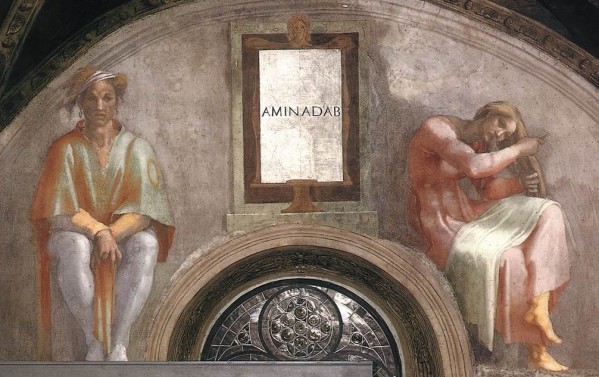My only former point of reference for Blanchot’s fiction has been The Last Man, which, while stunning, was incredibly dense, and at times a real chore to get through (which is ultimately a positive quality for a book to have, far more affective in this case). Aminadab, however, has more of a narrative to its core which allows a reader to actually get through it rather quickly, and the narrative progression provides something to hold on to (I mention these things not to presuppose that Aminadab is better than The Last Man, rather to just differentiate). This is an entirely different experience than The Last Man.
There is still, I think, just as much thought present here. Though Aminadab is earlier in Blanchot’s career, before things had become as articulated perhaps, but certainly after he had already set out his task in approaching literature.
But more to the point, on a purely subjective level, the narrative, or, I guess, “plot,” in this book, would normally be, basically, a nightmare to me. Literally: the only nightmares I have had for a decade and a half have been situations in which I am in a place that I am perhaps not comfortable being in and I have no way to get out of them (it is for this reason that I have a hard time dealing with Scorsese’s After Hours, even though aesthetically I should be way into it). But at the same time, it also uses my favorite plot device, that of the ‘stranger’ who enters or encounters a strange place and is forced to figure out how to navigate and deal with said space of literature. The quest, you could say, is my favorite narrative archetype. Though I, of course, prefer the abstracted permutations of it, which this certainly is.
Our protagonist waivers between autonomy, arrogance, naivety, confusion, and responding to simple deception– Blanchot constantly decenters him, permutes his location within the diegesis. While he has no history, no real present, nor even any real motivation (outside of a latent desire to find the woman who may or may not have waved to him through a window in the house he is exploring), this constantly re-centered intellect strikes me as more “realistic” than what one would regularly label a ‘three dimensional character.’ Every Other that Thomas encounters throughout the text places any character met beforehand in a darker light, constantly lies and truths question everything. The novel is a series of re-orientations throughout the architecture of a house.
The house being the locus of the narrative is perhaps my attraction to it: the house is simultaneously present & absent. Blanchot does not devote an excess of time to imagistic prose; there are hints of the space and the objects within the space, but mostly any description is vague and indefinite (a technique, I believe, that adds to the affect of said narrative space). Yet, at the same time, what is described are impossible, overwhelming, hyper-present. This tension is marvelous, and I think more enticing than an abundance of architectural description (it is the tone of architecture that is more affecting in real life that the description, the understanding, no?).
In the end we arrive at a realization that Thomas does have a memory: a single memory, of a woman from his past who, he insists, he has been searching for. A woman he knows nothing about, yet insists upon a comfort in (want to connect this with Anna Kavan, and I think Ice & Mercury [two sides of the same coin] are the emotional/literary “core” of said author, perhaps)… there’s a lot that goes on in a limited physical space. The space of the narrative is defined within conversation. Characters speak for pages at a time, describing literally nothing.
A space of literature. A beautiful place to enter. A infinite space.
Tags: Anna Kavan, Maurice Blanchot, nightmares


Yes. Adding/buying/reading.
Is that mirror writing with backward (in the mirror) letters?: BAD ANIMA
bit.ly/dwCtMj
http://shortlinks.co.uk/36yj
The looker is the bad anima? Looking at its reflection?
i love reading brick walls of monologue. the idea of this woman reminds me of ALL THE NAMES. it’s a point of focus.
i love reading brick walls of monologue. the idea of this woman reminds me of ALL THE NAMES. it’s a point of focus.
http://shortlinks.co.uk/36yj
hey, thanks for this post; have never heard of this guy let alone read him; will order one of his books (that’s why I like this site)
Odd as it might be for Blanchot to chose reversed english as the title for his french novel, “bad anima” actually makes a whole lot of sense here.